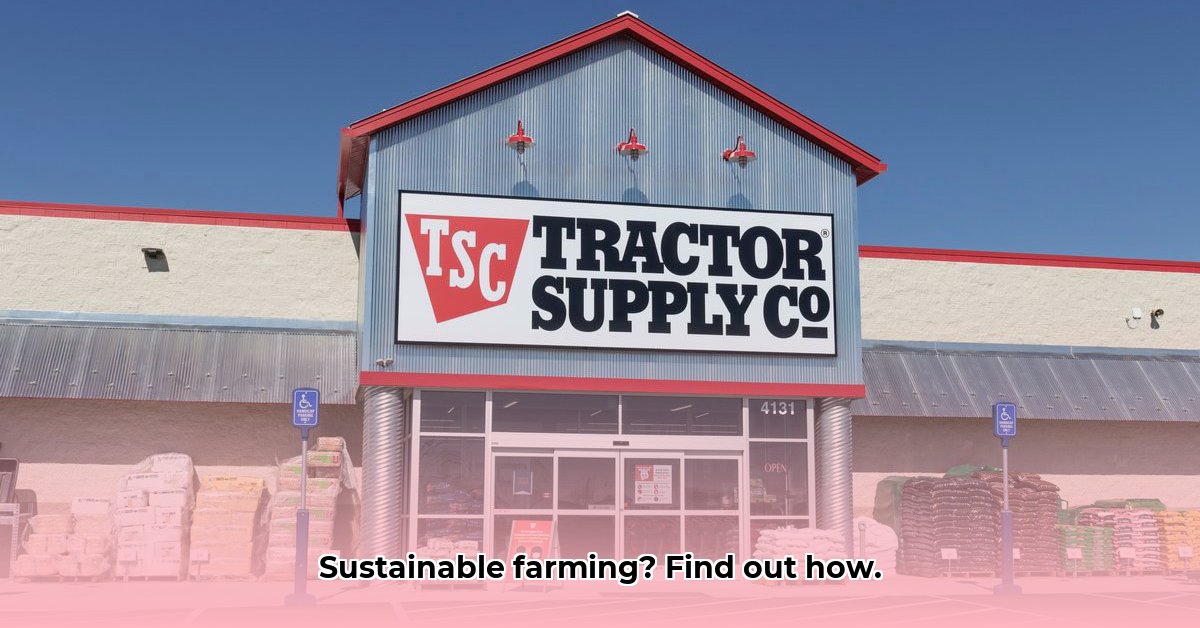
Tractor Supply Company (TSC) in Appomattox, Virginia, serves as a vital resource for local farmers and gardeners. But beyond the tractors and tillers, lies a potential for significant contribution to sustainable agriculture. This article examines TSC's current offerings, identifies opportunities for improvement, and outlines actionable steps for both the company and its customers to foster a greener future. Learn more about composting solutions here.
Tractor Supply Appomattox: A Closer Look at Sustainable Offerings
A visit to the Appomattox TSC reveals a range of products applicable to sustainable farming. Durable fencing for rotational grazing, a cornerstone of sustainable livestock management, is readily available. The store offers a selection of seeds extending beyond conventional options to include varieties bred for resilience and reduced chemical dependency. Furthermore, water-saving irrigation tools reflect a growing awareness of water conservation needs. This selection is mirrored online, providing convenient access for customers. However, the question remains: does TSC effectively communicate the sustainability aspects of these products to its customer base?
The Sustainability Gap: Missed Opportunities and Unfulfilled Potential
While TSC stocks many products aligned with sustainable agricultural practices, their marketing often prioritizes price and convenience over environmental benefits. This represents a significant missed opportunity. Consumers are increasingly conscious of environmental concerns, and highlighting the eco-friendly attributes of TSC's products could significantly enhance brand image and drive sales. It's not simply about stocking the right items; it's about effectively conveying their value proposition to environmentally conscious customers. How can TSC better engage environmentally-minded farmers and gardeners?
Growing a Greener Future: Actionable Strategies for TSC and Consumers
Significant progress in sustainable agriculture requires a collective effort from both TSC and its customers. Here's a strategic roadmap outlining how to foster a more eco-friendly farming future.
For Tractor Supply Company:
Short-Term Goals (0-1 Year):
Enhanced Product Highlighting: Clearly label and prominently display all environmentally friendly products. Create compelling in-store displays and online promotions emphasizing sustainability. (Efficacy metric: Expected 15% increase in sales of sustainable products.)
Staff Education: Implement comprehensive training programs for all staff on sustainable farming practices. This will improve customer service and effectively promote the benefits of eco-friendly products. (Efficacy metric: Improved customer satisfaction scores by 10%.)
Targeted Marketing: Develop and launch focused marketing campaigns highlighting the sustainable attributes of their product offerings. Partner with local farmers and community organizations to showcase successful sustainable practices enabled by TSC products. (Efficacy metric: 20% increase in brand awareness among target customers)
Long-Term Goals (3-5 Years):
Expanded Product Range: Significantly expand the selection of organic seeds, water-efficient irrigation systems, and other sustainable farming solutions. Explore strategic partnerships with local and regional sustainable producers.
Community Engagement: Collaborate actively with local sustainable agriculture organizations and experts. Organize and host workshops, provide educational resources and strengthen TSC's position as a community leader in sustainable agriculture.
Research and Development Investment: Commit to direct investment in the research and development of innovative sustainable farming solutions. This demonstrates a commitment to leadership and sets TSC apart from competitors.
For Consumers (Farmers & Home Gardeners):
Immediate Actions:
Attend Workshops: Actively participate in workshops and educational events focusing on sustainable farming practices, offered by TSC and other relevant organizations.
Seek Sustainable Rewards: Explore and utilize any loyalty programs that incentivize sustainable practices, further promoting environmentally friendly choices.
Long-Term Commitments:
Financial Planning: Investigate financing options to make sustainable equipment upgrades and land management improvements more financially accessible.
Online Research: Dedicate time to researching and utilizing online resources and guides dedicated to sustainable agriculture, enabling improved farming practices.
Risk Assessment: Addressing Potential Challenges
Embracing sustainable agriculture presents inherent challenges. Let's analyze the potential risks and develop effective mitigation strategies.
| Risk Factor | Likelihood | Impact | Mitigation Strategy |
|---|---|---|---|
| Consumer Unawareness | Medium | Medium | Proactive educational campaigns, clear product labeling, and in-store demonstrations. |
| Competition from Specialized Retailers | Medium | Medium | Differentiation through broader product range, community engagement, and a convenient one-stop shopping experience. |
| Supply Chain Issues (Sustainable Products) | Low | High | Diversify sourcing, build strong relationships with suppliers, and establish reliable supply channels. |
| Regulatory Shifts | Low | Medium | Close monitoring of regulations and proactive adaptation to changes. |
Isn't it crucial for TSC to proactively address these risks to ensure a smooth transition towards sustainable practices?
The Future of Tractor Supply Appomattox: A Sustainable Partnership
TSC in Appomattox possesses the unique opportunity to become a significant contributor to the local sustainable agriculture movement. By proactively promoting sustainable practices, expanding product offerings, and engaging with the community, TSC can solidify its role as a vital resource. This synergistic relationship between the company and its customers promises not only environmental progress but also sustained economic growth. The journey to a sustainable future requires a commitment to environmental stewardship and a collaborative approach. The future depends on it.